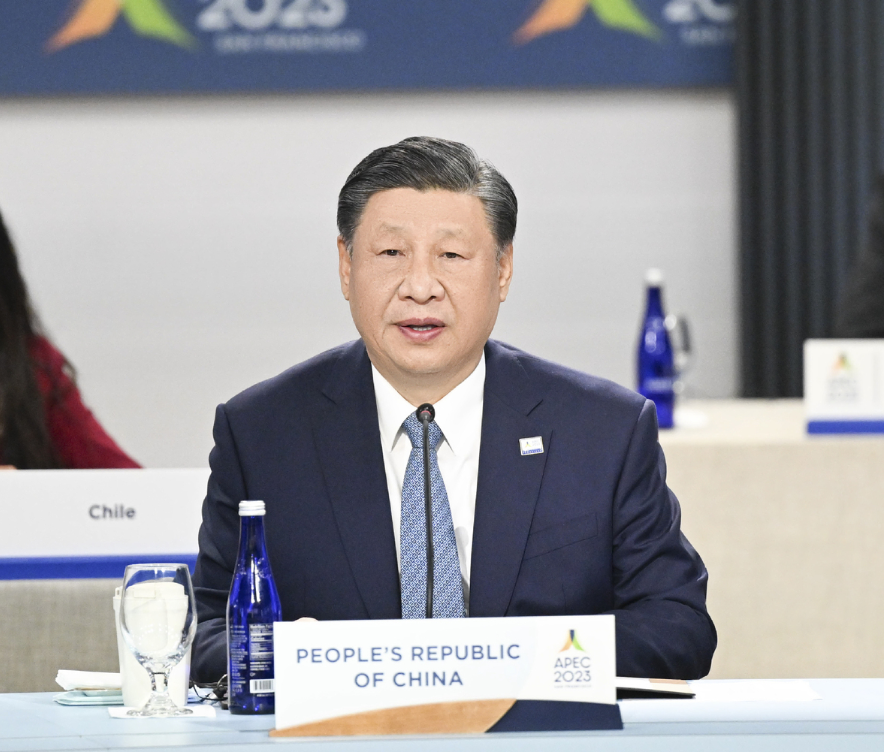President: 'Next China' is still China
 President Xi Jinping addresses the Asia-Pacific Economic Cooperation (APEC) Economic Leaders' Informal Dialogue with Guests and working lunch in San Francisco on Thursday. XIE HUANCHI/XINHUA
President Xi Jinping addresses the Asia-Pacific Economic Cooperation (APEC) Economic Leaders' Informal Dialogue with Guests and working lunch in San Francisco on Thursday. XIE HUANCHI/XINHUA
Nation committed to sharing gains of development, Xi tells APEC meeting
President Xi Jinping has reaffirmed China's commitment to expediting its efforts to modernize its industrial system, providing better institutional safeguards to enable business entities of all types to share the gains of development, and fostering new drivers of growth.
China will continue to pursue development with its doors open, the president said in a written speech delivered to the Asia-Pacific Economic Cooperation (APEC) CEO Summit in San Francisco on Thursday.
"We will unswervingly advance high-standard opening-up and further expand market access," he said in the written speech.
The president also pledged to take more "heart-warming" measures, such as improving the policies on the entry and stay of foreign nationals in China and removing choke points they face in financial, medical, e-payment and other services, to make it easier for foreign companies to invest and operate in China.
As for the Chinese economy, Xi said it remains promising and it will remain so in the long run, due to its strong resilience, enormous potential and ample room for maneuver.
"We have the confidence in, and even more capability of, achieving long-term and stable growth, and through our development we will continue to provide the world with new growth momentum and opportunities," he said.
China remains the most powerful engine of global growth, and will generate one-third of global growth this year, he added.
"Just as some leaders of the business community have said, China has become a synonym of the best investment destination, and that the 'next China' is still China," Xi said.
Figures released by China's National Bureau of Statistics on Wednesday showed that the nation's economic recovery continued to gather steam in October.
China's retail sales, a gauge of consumption, grew 7.6 percent year-on-year in October, up from the 5.5 percent growth in September. Value-added industrial output also grew at a faster 4.6 percent in October, accelerating from 4.5 percent in September.
Xi said in the written speech to the business leaders that China's resolve to foster a market-oriented, law-based and world-class business environment will not change despite all of the changes in the international landscape.
"Our policy of providing equal and quality services to foreign investors will not change," he said, adding that Beijing will continue to improve the mechanisms for protecting the rights and interests of foreign investors, further shorten the negative list on foreign investment, fully ensure national treatment for foreign investors, and continue to strengthen IPR protection.
"We will strive to tear down the barriers to the flow of innovation factors, deepen reform of the digital economy, and promote free and orderly flow of data in compliance with the law," he said.
The president pointed out that openness and inclusiveness are the defining features of Asia-Pacific cooperation.
"Development in our region has been achieved not through provoking antagonism and confrontation, pursuing a beggar-thy-neighbor policy, or erecting high fences around a small yard, but by staying open and inclusive and drawing on each other's strengths," he said.
Xi stressed that forcing uniformity will not advance cooperation in the region, and seeking common ground while shelving differences is the right way forward.
"We should jointly uphold the purposes and principles of the UN Charter, and follow the right norms for state-to-state relations to maintain Asia-Pacific prosperity and stability through dialogue and partnership rather than confrontation and alliance," he said. "The region cannot and should not be an arena for geopolitical rivalry, still less should it be plunged into a new cold war or camp-based confrontation."
The president also highlighted the need for the Asia-Pacific region to "move along with the trend to promote transition to digital, smart and green development".
"We should jointly improve global governance of science and technology, bolster support for green and digital transition and sustainable development through innovation, and build an open, fair, just and nondiscriminatory environment for the development of science and technology," he said.








